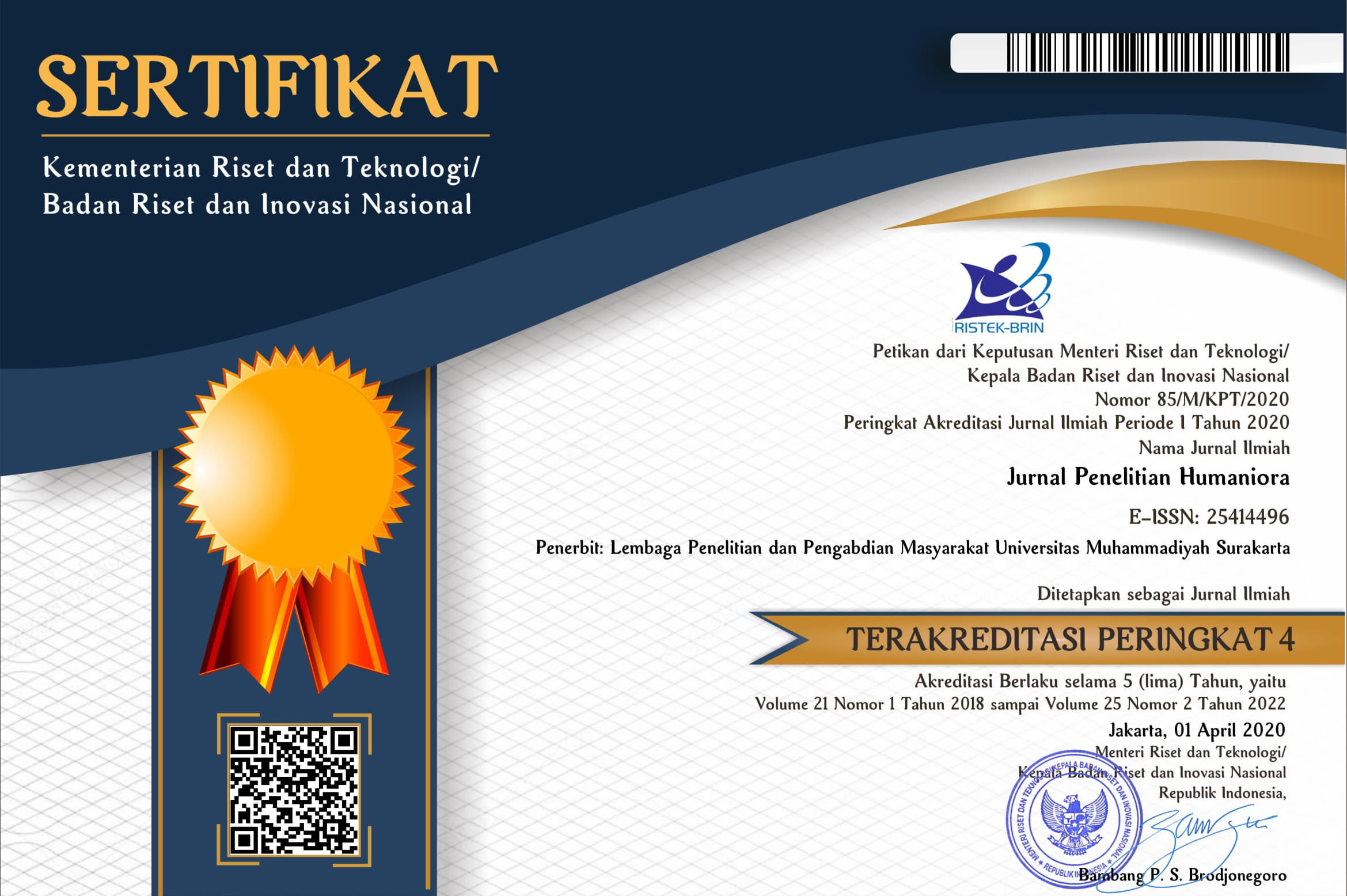Abstract
This study aims at (1) identifying the lingual form of disfemism in Joko Widodo's Facebook account; (2) describing the addressing form containing sarcasm in Joko Widodo's official Facebook account; and (3) identifying the sarcasm expression used by the operator and the uploader of the account. The object of this study is polite expressions. Linguistic unit of the expressions can be in the form of word, phrase, clause, and sentence. The data of this present study are sentence or sentences in Jokowi's official Facebook account that contains positive connotation words. The data contexts of this research are discourse containing positive connotation sentences, the topic of discourse written by people in Jokowi's account, the identity of the participant, and the context of extra-lingual that is based on the importance of the operator of the president's social media account. The data collection was conducted through documentation technique. The data in Jokowi's official account were copy-pasted. Then, the data were being read intensively to note the positive connotation utterance. The data analysis was conducted through referential (identity) method, pragmatic (identity) method, translational (identity) method, and articulatory phonetic (identity) method. The referential (identity) method was used to identify the topics that were stated by the uploader of the account. The pragmatic (identity) method was used to identify the background of (profession, organization etc) that appeared in their writings. The translational (identity) method was used in describing the origination of the language they use. It is possible that through the use of this method, this study finds the register on that account. Finally, the phonetic (identity) method was used to identify the utterance characteristic they stated. The positive or negative emotion of the speaker, usually, marked by the special pronunciation. To establish the data analysis, this study uses distributional method: substitution technique and paraphrase technique. Based on the data analysis, this study shows several results. First, the euphemism utterance in Jokowi's official Facebook account using any levels, i.e. word, phrase, clause, and sentence. Through those levels, the writer presents suggestions and critics to the owner of the account Joko Widodo. Second, the functions that are stated through that account are expression device, communication relationship to the leader, integration device, and self-control device. Third, the topics stated by the people in that account are about the depiction of Joko Widodo that in their opinion, Joko Widodo shows pretending, the existence of Megawati in the election of Joko Widodo as a president, the increasing of IDR currency and other things at the beginning of his leadership. The expression shows hatred towards the elected president. Furthermore, they also express about Jokowi's unability to establish the IDR currency and his leadership is judged as not good. In addition, to the people, especially netizen are invited to disbelieve to his leadership.
Keywords
Jokowi; Joko Widodo; Euphemism value; social media account; Facebook; netizen
References
Arikunto, Suharsimi. 2010. Prosedur Penelitian. Jakarta: Rineka Cipta.
Farida, Nur. 2012. “Penggunaan Eufemisme dalam Tajuk Rencana Koran Kompas”. Skripsi. Jakarta: UNEJ.
Febrianjaya, Abdan Syakur, dkk. 2013. “Penggunaan Eufemisme dan Disfemisme pada Tajuk Rencana serta Implikasinya terhadap Pembelajaran”. Jurnal Kata. September 2013. P.1-8.
Kurniawati, Heti. 2011. “Eufemisme dan Disfemisme dalam Spiegel Online”. Litera. Vol. 10, No. 1, April 2011. P.51-63.
Kridalaksana. 2008. Kamus Linguistik. Jakarta: PT. Gramedia Pustaka.
Moleong, Lexy J. 2014. Metode Penelitian Kualitatif. Bandung: Remaja Rosdakarya.
Rosadi, Imron; Rusdi Noor Rosa, Yuli Tiarina. 2015.“Differences in Euphemisme Used by Male and Female in Minangkabaunese”. English Language and Literature E-Journal / ISSN 2302-3546. P. 121-132.
Rustam. 2011. “Eufemisme dalam Ungkapan Tradisional Daerah Melayu Jambi”. Jurnal Penelitian Universitas Jambi Seri Humaniora. Vol. 13, No. 1, Januari-Juni 2011. P.1-6.
Sarosa, Samiaji. 2012. Penelitian Kualitatif: Dasar-dasar. Jakarta: PT Indeks.
Sudaryanto. 1993. Metode dan Aneka Teknik Analisis Bahasa. Yogyakarta: Duta Wacana University Press.











